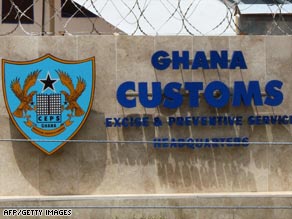Mr. Chairman, Members of the Corporate Council of Africa, Distinguished Business Executives and Friends of Ghana, Ladies and Gentlemen,
It is indeed a pleasure to be here today. We bring you warm and fraternal greetings from the Government and people of Ghana. (We hope the warmth will begin to dispel the cold front!) I must thank the staff of the Corporate Council on Africa and the many corporate sponsors of this event for this invitation. I would also like to express my gratitude to officials of the U.S. government for the warm reception accorded us and the excellent arrangements made for our stay here in Washington.
The very presence here of so many corporate executives demonstrate the confidence you have in the continent of Africa and specifically in our country, Ghana. This confidence is very well-placed because our continent has not other direction to go but forward.
Africa, we all know, is a continent with the richest array of resources in the world; yet it remains the most undeveloped and currently accounts for only two percent of world trade. We need to ask ourselves, why this is so. No continent has been as battered as the African continent - in the colonial era, in the struggle for independence, during the period of the Cold War, and not post-Cold War. Africa has often been assailed by external forces who have been attracted by its resources but only for their own one-sided interests. Africa was victimized during the colonial period by her raw materials and her human resources being exploited to build up value for other continents. More recently, during the period of the Cold War, Africa has been victimized by super power rivalry which posed false choices for our leaders between competing political and economic poles without any specific reference to our circumstances on the continent.
Much of the condemnation of Africa, or the dismissiveness with which Africa is treated in certain quarters is unfair and unjust. The native American saying that "you need to walk in my shoes to understand my existence" is very appropriate for understanding African's situation.
We do accept responsibility for our own failures, and we in Ghana have decided firmly that we will not be a failure; we will uphold the image of Africa, we will show the world what is positive and successful, what is noble and elevating from our continent. This giant of a continent is stirring itself up and I am confident that you who put your faith, your commitments, your investments in Africa will not be disappointed!
In recent years, astute business people, for very good reasons, have been looking to the continent as a dynamic region to make sound new investments. There has come a realization that the continent not only has natural resources but also has a huge population whose tastes and demands can stimulate new phases of industrial development and economic boom in the world. Mining, for example, has always been big business in Africa, but now investors are looking to shift to more value-added production on the continent taking advantage of the lower labor costs. Agribusiness, utilities, the energy sector, manufacturing, financial and tourism services offer other opportunities. In the telecommunications field, the giants of the industry, from the United States, Japan, Germany, Britain and France are all making investments in a continent that is ripe for major new initiatives.
I acknowledge the fact that political stability and security of investment is of paramount importance to investors. And in this respect, the history of conflicts in certain regions and countries of Africa gives some investors pause. But as we get to the roots of these conflicts, we can clearly see that the economic development of the continent will contribute immensely to resolving many of these situations of conflict. Today, we in Ghana are proud that amidst the ocean of well-reported conflicts, there are islands of peace and political stability the offer themselves as havens for foreign investment. One of such countries in Africa is Ghana. Those of you who have not visited Ghana recently, or those who have not visited at all, do not know what you are missing!
Our many favourable attributes include:
o a stable political and social environment in which the safety of your persons, property and investment is assured;
o a determined and consistent government following a prudent and disciplined economic reconstruction program;
o a liberalized trade policy and exchange rate regime that has enabled a complete transformation of access to foreign exchange in the economy. Whit the number of forex bureaus doing brisk business in the city of Accra, for instance, I understand it is easier to deal in foreign currency, especially travelers cheques, in Accra than it is here in Washington!
We also have
o a very well-endowed natural resource base that includes gold, diamonds, manganese, bauxite and other minerals, large tracts of arable land and climate that together create a good basis for agriculture and still underexploited sea resources.
o an environment of relatively cordial relations between labour and management; we seek to establish regular and close consultation between government, employers and labour unions under a tripartite negotiation mechanism. The workforce itself is relatively better educated than many places in t he world, and quite skilled.
I should point our further that Ghana offers
o ready access to other regional and international markets, such as the 16-member 200 million people Economic Community of West African States (ECOWAS), as well as access to the over half a billion people in the European Community Caribbean and Pacific, Lome Convention trading area, based on our most favoured nation status.
Most significant of all, Ghana boasts a warm, friendly, intelligent and honest people who are a delight to do business with.
We have made considerable efforts over the last decade to become, in the eyes of objective observers a role model for good performance and successful economic recovery.
Most of you here must have heard of the economic turn around that has occurred in Ghana since 1982. This was achieved through the design and implementation of an Economic Recovery Programme that enabled us to achieve steady growth of about 5 per cent per annum from the early 1980's, a period some refer to as Africa's "lost decade." Our key objective has been to stimulate productivity and encourage both foreign and local private investment, and ensure a prudent and effective harnessing of public resources.
Among the important priorities have been the restoration and maintenance of fiscal and monetary discipline, and the control of inflation. We succeeded in bringing inflation from nearly 130% per annum in the early 1980's to less than 30% per annum today. Meanwhile, domestic savings and investments have increased by 12% and 14% per annum respectively in recent years. We are by no means satisfied with these figures. Inflation has to go down much further so as to make life more comfortable for the man and woman in the street, and we are currently focusing on how to ensure this.
Other priorities of our economic recovery program include the rationalization of the public section by way of divestiture of over 300 state-owned enterprises (SOEs) and the trimming down of the over-bloated civil service by about 60%.
The government has concentrated public investment expenditure on infrastructure rehabilitation, which has brought many urban and feeder roads up to acceptable modern standards. Similarly, transport and communications infrastructure - our telephone systems which are so important for business people, our ports and harbours - have all undergone a transformation in recent years. The National Electrification Scheme to extend electricity to all parts of the country is very much on course. The extent of commitment of communities throughout the country to contribute to bringing this important benefit to themselves has been remarkable. To meet the rapidly growing demand for electricity that our economic recovery programme has stimulated we are now encouraging independent power producers to get involved in energy production.
All of the above reform measures have had the effect of making both the rural and urban areas of Ghana good sites for a wide variety of investments.
Ladies and Gentlemen,
Ghana's economic progress has been reinforced by the successful political transition to multiparty democracy and constitutional rule. We established a new constitutional order from January 1993 after Presidential and Parliamentary elections. There has been quite an exuberant testing of the new Constitutional order. Some have even tried to provoke situations of anarchy under the guise of freedom, but as a Government we have not been unduly prickly about even some excesses, though we will not countenance a reversal of the gains we have made. The Judiciary has been eager to assert its independence and operates unrestrained. All this is an eloquent pointer to the tolerance, degree of understanding, and the willingness and determination of the government and people to succeed in fulfilling our national aspiration of prosperity in freedom and with justice.
Our efforts at establishing democratic institutions included a conscious policy of decentralizing political power and public administration. This has led to the establishment of 110 District Assemblies through which the local communities now have the authority to initiate and implement development programs that meet their own defined material and cultural needs.
Ladies and Gentlemen,
I recently signed into law a new Ghana Investment Promotion Centre Act 1994 that was passed by Parliament. This Law, unlike the old Code, mandates the Ghana Investment Promotion Centre to promote, rather than regulate, investment. Copies of the Law, setting out the incentives and concessions to both domestic and foreign investors, can be obtained through our Embassy here.
The new Law obviates the need for new enterprises to go through long bureaucratic approval processes. An investor only need register or incorporate the enterprise in accordance with the Ghana Companies Code 1963 (Act 179.) Incentives and concessions are triggered automatically and do not require separate application and approval. Incentives under the new Law include: full exemption from Customs import duties on plant machinery and equipment required for the setting up of the enterprise; accelerated depreciation; guaranteed transferability of profits, dividends, royalties, director's fees and capital in the event of liquidation or an enterprise; guarantees against expropriation of the enterprise; guarantees against being forced to cede any part of an investor's interest in the enterprise and a framework for settlement of investment disputes.
Ghana, as most of you know, is a member of the Multilateral Investment Guarantee Agency (MIGA) of the World Bank Group. As such, investors can benefit from the insurance and guarantee services provided for projects in member countries of the World Bank. The Overseas Private Investment Corporation (OPIC) of the United States is also very willing to provide investment guarantees for American investors going to Ghana.
Ladies and Gentlemen, Friends of Ghana,
I am happy to see so many faces in this audience who represent U.S. companies that are already contributing to Ghana's economy. We applaud you. But I will be even happier if by the end of my visit, we have an even greater number of companies heading for Ghana and more investments flowing in.
It should not surprise you to hear that The Ghana Stock Exchange has recently been ranked amongst the best of emerging stock markets in terms of performance and capital appreciation. When the New York Times in April 1994 recommended five major African Stock Exchanges on which American investors might invest, the newspaper placed the Ghana Stock Exchange at the top of the list. With more than 70 percent in annual average stock appreciation in 1993 and also in 1994, the stock market in Ghana, though young, is already providing an attractive framework for foreign investors to participate in Ghana's economic transformation. With a current market capitalisation of US $1.8 billion, it is also the 3rd largest sub-Saharan Stock Exchange.
It was on this Stock Exchange as well as on the London Stock Exchange that last year some of Government's shares in a major national asset, the Ashanti Goldfields Corporation, were floated. The success of that floatation is still being talked about and I am happy to have in my delegation here the Chief Executive of Ashanti Goldfields, Mr. Sam Jonah. It was also on the Ghana Stock Exchange that the Government sold its shares in some multinational companies to foreign partners like Unilever. I am also happy to have in my delegation the Chairman of Unilever Ghana, Mr. Ishmael Yamson.
The involvement of such stalwarts of the private sector in my team here is a manifestation of the close relations we are forging between Government and the private sector in Ghana. Our Chambers of Commerce and Mines, the Association of Ghana Industries, the Ghana Employers Association, Private Sector Advisory Group, and the newly formed Private Enterprise Foundation are all key players in our march towards a better future.
Ladies and Gentlemen,
I deem it important to find time to address you during my rather short stay here in deference to the statement attributed to President Calvin Coolidge that: "The business of America is business." To succeed in business in an increasingly competitive global market place requires you to be open to new opportunities, to seek, in the best American tradition, new frontiers to conquer. Africa, we are told, is the last unconquered frontier for business, and we hope many of you here will participate in this challenge of African economic development, specifically in Ghana.
Ghana has a bright future. That future depends not only on sound and stable government policy in a peaceful environment but also on a larger role for the creativity of the private sector. That future must involve the foreign business community, particularly the American business community. I may add that they are important links between the activities of U.S. governmental agencies and private business.
The aid programmes of USAID for instance create opportunities for U.S. trade and investment to follow up on. We have been very satisfied with the assistance USAID is providing us, among other things to help our export drive. We are also hopeful that U.S. governmental initiatives such as the Shipbuilding Initiative under the Maritime Administration of the Department of Transportation, the opening up of new markets by the Commerce Department and the availability of export credit lines of US Eximbank will all contribute to strengthening economic relations between the U.S. and Ghana. We, the Government of Ghana, are keeping our side of the bargain. We call on you, the American business community, to rise up to your part.
Thank you.
General News of Friday, 5 May 1995
Source: --
From the Ghana Embassy newsletter
Entertainment











